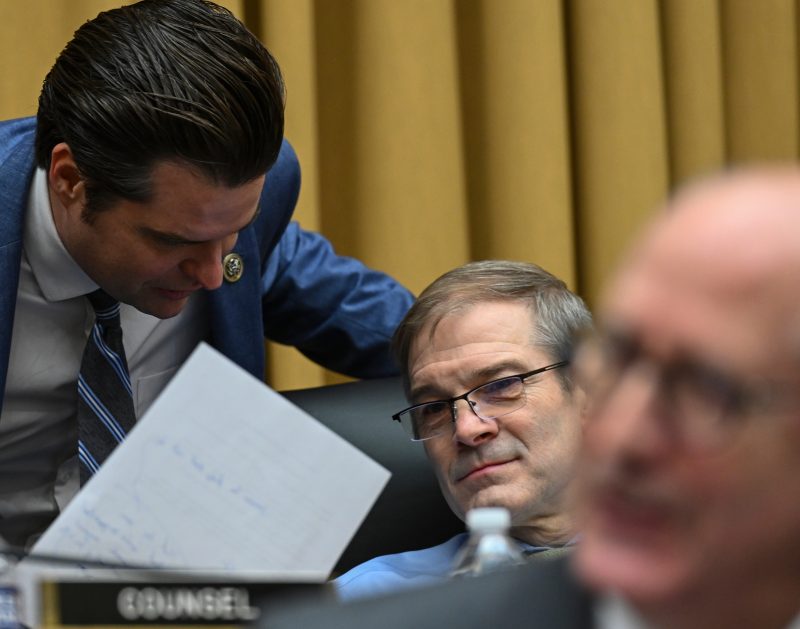The way things in Congress work these days, everything appears hopeless and unresolvable right up until the moment it gets resolved. Brinkmanship is one of the only potentially effective motivators, which gives us a skewed picture of what to expect. A case in point: the seemingly inevitable government shutdown last month that ultimately didn’t happen — at least not yet.
The search for the next House speaker
End of carousel
All of that said, Republicans have left themselves few options for electing a new speaker and getting out of the mess they’ve created. Tensions and factionalism appear to be on the rise as Rep. Jim Jordan’s (R-Ohio) bid struggles. With a solution arguably now more elusive — and with more than two weeks having passed since Kevin McCarthy’s ouster — it’s fair at this point to start examining the potential political impact.
The first thing we should emphasize is that this whole drama is rather inside-baseball for your average American. Who is following the ins and outs of electing a speaker? Not many people.
A Yahoo News/YouGov poll released Tuesday showed just 17 percent of Americans said they were following the situation “very closely.” Almost half said they were following it “not very closely” or not at all. People also tend to oversell their news consumption habits.
But one needn’t understand the arcane procedures of the House to grasp the very basic facts here. Those facts are that Republicans have struggled in a historic way to execute what is quite literally the first order of business for the one lever of lawmaking power they control right now.
And to the extent this becomes even more prolonged, there are signs it could register with voters.
A CNN poll conducted in the week after McCarthy’s ouster showed disapproval of Republicans in Congress rising to 74 percent. That’s up from the mid-to-high 60s in recent years and is tied for the party’s highest congressional disapproval since 2012.
Democrats’ disapproval (64 percent) was also up and historically on the high end, but the GOP’s was 10 points higher.
A Quinnipiac University poll released Tuesday also speaks to this. It asked whether the two parties put party over country or country over party with their actions in Congress. In both cases, Americans viewed the parties as mostly looking out for themselves. But while they said this about Democrats by a 34-point margin, they said it of Republicans by a 50-point margin.
It’s the first time the pollster has asked this question, so we don’t have a direct historical comparison. But Fox News polling from last year suggests it’s a shift. It gave people two similar options about members of the two parties:
“They love America and truly want what’s best for the country,” or“They simply want what’s best for their party, even if it hurts the country.”
In that case, more Americans had actually said Democrats were generally self-interested (by a 15-point margin) than that Republicans were (by a 9-point margin).
Perhaps more to the point when it comes to the speakership chaos, the Quinnipiac poll also suggested that Americans see a significant difference between the Democratic-led Senate and the GOP-led House. While a majority of Americans (54 percent) were are least somewhat confident that the Senate could respond effectively to a crisis, just 35 percent said the same of the House.
The YouGov poll also showed an uptick in the percentage of American blaming Republicans for congressional gridlock.
After McCarthy’s election in January, the blame was pretty evenly proportioned between progressive Democrats and conservative Republicans and between moderates of both parties. But today blame for Democrats has remained about the same, while blame for conservative Republicans has increased by seven points and for moderate Republicans has increased by 11 points.
We shouldn’t oversell these splits and shifts. In addition to the potentially very temporary nature of all this — particularly if Republicans can bring matters to a close soon — many of the differences are the result of Republicans souring on their own leaders, more so than independents.
But perhaps the biggest impact could be in the opportunity lost. The timing of all of this appears particularly unfortunate for Republicans.
It comes as they appear much more competitive in the 2024 election than they did in 2020. It comes after, for the first time in years, they had closed a long-standing image gap with the Democratic Party. It also comes after multiple polls showed them gaining a historic lead on the economy — the largest-ever in NBC News’s polling and the largest in three decades in Gallup polling.
That Gallup poll also showed the GOP holding significant leads on many key issues, including which party could make the country prosperous (53-39), which party would be better on international terrorism and military threats (57-35) and which party would do a better job on your pet issue (44-36).
The same day Gallup published those findings, eight House Republicans succeeded in removing McCarthy as speaker, leaving their party a mess that has proven, at the very least, a complicating factor.

